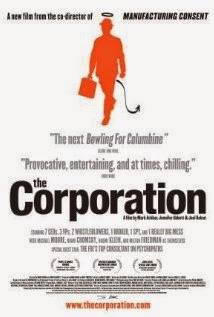This documentary takes an in-depth psychological examination of the organization model through various case studies. What the study illustrates is that in the its behavior, this type of "legal person" typically acts like a dangerously destructive psychopath without conscience. Furthermore, we see the profound threat this psychopath has for our world and our future, but also how the people with courage, intelligence and determination can do to stop it.
This movie discusses enterprises' ethics, the focus is the conflicts between corporations and the public welfare. How to define corporations' externality? And how to define corporations' responsibility, especially their responsibility for the public? These all remain as issues for all the people who care about their own society.
Quotes:
Robert Monks: Again and again we have the problem that whether you obey the law or not is a matter of whether it's cost effective. If the chance of getting caught and the penalties are less than it costs to comply, people think of it as just a business decision.
Narrator: 150 years ago, the business corporation was a relatively insignificant institution. Today, it is all-pervasive. Like the Church, the Monarchy and the Communist Party in other times and places, the corporation is today's dominant institution. This documentary examines the nature, evolution, impacts, and possible futures of the modern business corporation. Initially given a narrow legal mandate, what has allowed today's corporation to achieve such extraordinary power and influence over our lives? We begin our inquiry as scandals threaten to trigger a wide debate about the lack of public control over big corporations.
Milton Friedman: An externality is the effect of a transaction between two individuals on a third party who has not consented to, or played any role in the carrying out of that transaction. And there are real problems in that area. There's no doubt about it.

This movie discusses enterprises' ethics, the focus is the conflicts between corporations and the public welfare. How to define corporations' externality? And how to define corporations' responsibility, especially their responsibility for the public? These all remain as issues for all the people who care about their own society.
Quotes:
Robert Monks: Again and again we have the problem that whether you obey the law or not is a matter of whether it's cost effective. If the chance of getting caught and the penalties are less than it costs to comply, people think of it as just a business decision.
Narrator: 150 years ago, the business corporation was a relatively insignificant institution. Today, it is all-pervasive. Like the Church, the Monarchy and the Communist Party in other times and places, the corporation is today's dominant institution. This documentary examines the nature, evolution, impacts, and possible futures of the modern business corporation. Initially given a narrow legal mandate, what has allowed today's corporation to achieve such extraordinary power and influence over our lives? We begin our inquiry as scandals threaten to trigger a wide debate about the lack of public control over big corporations.
Milton Friedman: An externality is the effect of a transaction between two individuals on a third party who has not consented to, or played any role in the carrying out of that transaction. And there are real problems in that area. There's no doubt about it.


没有评论:
发表评论